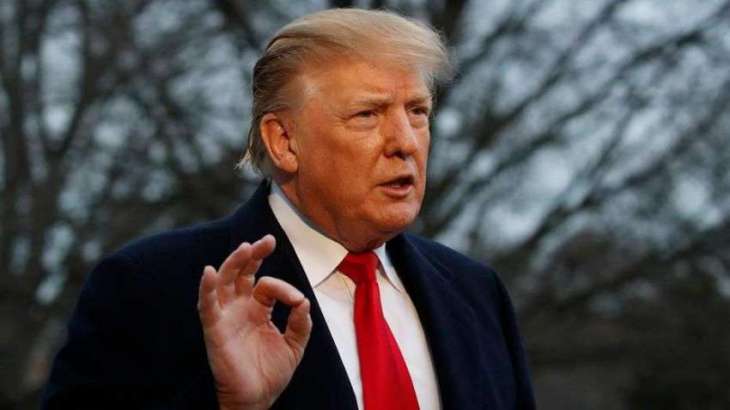US House Democrats, with support from some Republicans, impeached former President Donald Trump for the second time of his presidency on a 232-197 vote following a January 6 riot by a group of Trump supporters on Capitol Hill
MOSCOW (Pakistan Point News / Sputnik - 09th February, 2021) US House Democrats, with support from some Republicans, impeached former President Donald Trump for the second time of his presidency on a 232-197 vote following a January 6 riot by a group of Trump supporters on Capitol Hill.
The US House of Representatives Articles of Impeachment charge Trump with "inciting insurrection" during a rally in which his loyalists sought to prevent the congressional certification of his election loss. Opening arguments in the Trump impeachment trial began on Monday, featuring nine US House Democrats named as impeachment managers.
Impeachment is a legal procedure during which charges are brought against top officials by a country's parliament.
In accordance with the US constitution, Congress has the right to remove the president from office before the presidential term expires on charges of "treason, bribery, or other high crimes and misdemeanors."
In 1868, Democrat Andrew Johnson, the 17th President of the United States (1865-1869) faced an impeachment procedure initiated by the Republican-dominated Congress. He was acquitted in the Senate by one vote.
In 1865, Johnson announced an amnesty that prescribed the creation of civilian state governments in the south of the country. Radical congressional leaders responded with their own reconstruction laws, on which Johnson imposed a veto. The president accompanied his vetoes with harsh statements that turned more moderate Republicans against him. After the 1866 congressional elections, the supporters of radical reconstruction were able to overcome these vetoes. In addition, they were trying to significantly limit presidential powers by passing a number of relevant laws, including the Tenure of Office Act. When Johnson allegedly violated this law by dismissing Secretary of War Edwin M. Stanton, the House voted on eleven articles of impeachment against him.
In 1974, Richard Nixon, the 37th president of the United States, was likely to have faced impeachment over the so-called Watergate scandal - the misconduct of a number of high-ranking officials in connection with attempts to break into the Democratic National Committee headquarters at the Watergate Hotel in Washington during the 1972 election campaign.
The investigation revealed facts of law violations by Nixon's supporters and members of his administration (bribery, threats, perjury). In 1974, a court ruled that Nixon was aware of attempts to cover up the crime at the Watergate Hotel. The House Judiciary Committee recommended removing Nixon from office. Faced with what seemed to almost certainly be impeachment, Nixon announced on August 8, 1974, that he would resign the next day, becoming the first US president to be removed from power this way.
Bill Clinton served as the 42nd president of the United States from 1993 to 2001. In 1998, Clinton became the second US president after Andrew Johnson to be impeached by the House of Representatives. Impeachment proceedings were based on allegations that Clinton had lied about and covered up his relationship with 22-year-old White House employee Monica Lewinsky. During the trial, Clinton denied guilt but finally was forced to confess to his lie.
On December 19, 1998, the House voted 228-206 to impeach him for perjury to a grand jury and voted 221-212 to impeach him for obstruction of justice. On February 12, Clinton was acquitted on both counts in the Senate.
On September 24, 2019, the Democrat-controlled House of Representatives initiated impeachment proceedings against the 45th president of the United States, Donald Trump (2017-2021) over his July 25 telephone call with Ukrainian President Volodymyr Zelenskyy. The Republican president allegedly attempted to solicit a foreign contribution to his presidential campaign for the 2020 vote by putting on hold the military aid for Ukraine unless Kiev agreed to probe his political rival, Joe Biden, and Biden's son, Hunter, for corruption-related misdeeds.
On December 19, the House voted to impeach Trump for abuse of power and obstruction of Congress. Trump has denied any wrongdoing, repeatedly dismissing the impeachment inquiry as a witch hunt aimed at reversing the outcome of the 2016 presidential election.
In February 2020, the Republican-majority Senate voted along partisan lines to acquit Trump of impeachment charges, ending a grueling five-month process.
On January 13, 2021, Trump became the first president to be impeached twice, after the US House of Representatives voted in favor of impeaching the president for "inciting" the January 6 storming of the US Capitol. Trump is facing a trial in the Senate on a charge of "inciting insurrection" after a group of his supporters entered the US Capitol to protest lawmakers certify electoral slates from battleground US states that Trump claimed were invalid and robbed him of election victory.
Because Trump is no longer in office, he cannot be removed with a guilty verdict as specified in the US Constitution. Nine US House Democrats who will serve as prosecutors in the upcoming Senate impeachment trial spelled out their Primary goal in a "Trial Memorandum" to be a lifetime ban on Trump holding public office.




